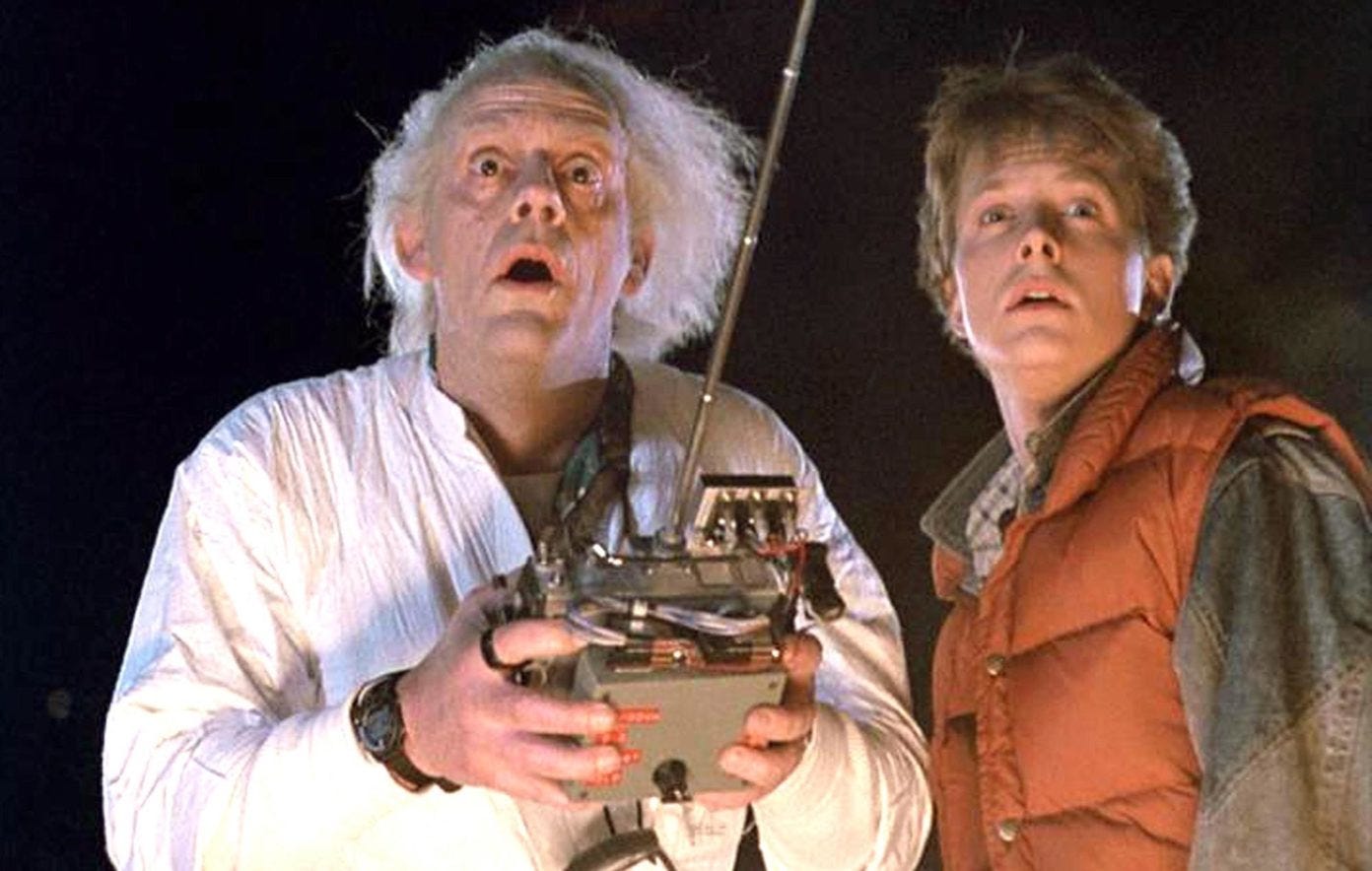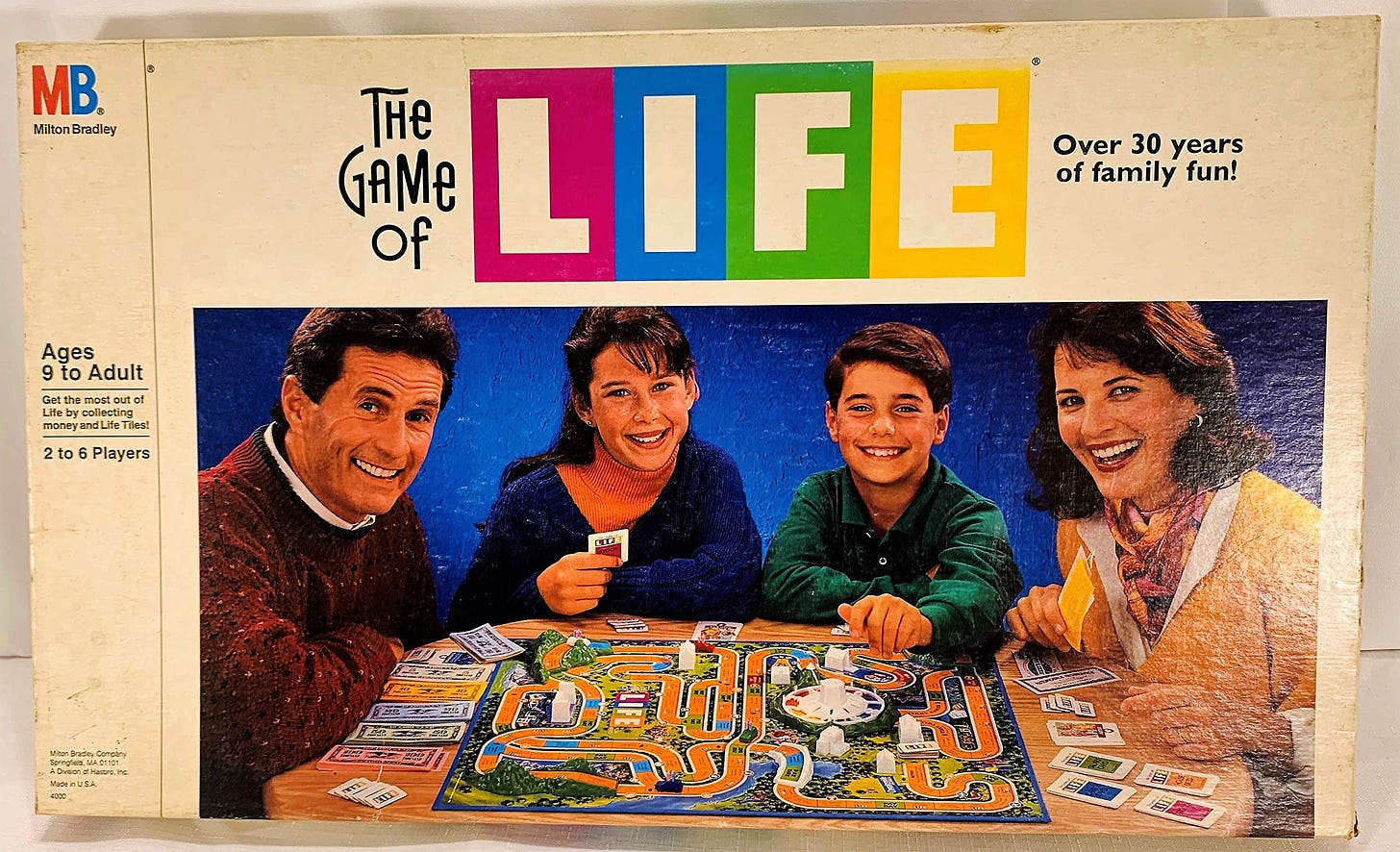It worked. You got up to 88 miles per hour and now you’re in the 1950s. Rock ‘n’ roll dominates the airwaves and record companies are clueless why it sells.
All they see are kids clearing the shelves with their cents and dollars.
The system works great. A&R guys sign on popular bands and the consumers — the kids — get what they want. But that starts to change in the 1970s.
Kids who grew up on rock ‘n’ roll now became the A&R guys. And they know what sound to look for. They use their discretion to swift through the genuine artists and find the commercial crap.
It sells but it isn’t good. Only the 80s punk and 90s Seattle scene break through the sterile corporate FM radio mold that dominates Western culture at the end of the 20th century.
Of course, now we have the Internet.
Anyone can upload their own music. You’ll find all sorts of new artists if you’re dedicated enough. I just discovered Geese and 3D Country.
Great fucking album.
Anyway, the point of all this is to say: money matters. The pursuit of profit can be useful.
Those early A&R guys were old. Many fought in World War 2 and lived through the Great Depression. They didn’t understand rock ‘n’ roll. They didn’t know what the fuck was going on.
They were never teenagers drinking soda pops at the local ice cream diner. Their job was to get white boys to sing the black boy songs before suburban mothers and fathers rioted.
And it worked. That’s how we got Elvis.
Those later A&R assholes became gatekeepers. They wore oversized aviator shades and suits too big for them. They did cocaine and called themselves experts. They knew music. They had savvy. They had their pulse on what the kids were listening to.
And they were idiots.
The Internet exposed their shenanigans for the most part. The Internet also competes with them. We have more freedom of choice now than ever with our music selections.
You can still tune into the mainstream Brat or you can ignore it altogether.
And we can thank profit. The pursuit of making money leads us to give the people what they want. From Chuck Berry to Geese to vinyl production in 2024 and music streaming services.
When those A&R guys said they knew what the kids wanted — they were sniffing their own arses. The earlier generations were better because they produced whatever worked.
And that’s the choice we have with large institutions like record companies. The music they produce is either a) the personal discretion of those who work there. Or b) the pursuit of profit.
There is no middle ground. No “third way” of organizing mass groups of people. This isn’t black-and-white thinking any more than 1+1=2 is.
When you find yourself in a group attaining some mutual goal there are two options. The first is the default. Organize based on an objective understanding of what that mutual goal supposedly is.
If it’s a charity or some other nonprofit organization, you use the most distinct language you can. You break it down into discrete steps. You list the specific behaviours and activities you expect to see from the other members of the group.
The larger the organization, the harder this becomes to control. For fundamentally there are no objective definitions of words. And certainly not in the realm of sociopolitical economy.
Numbers are different. Numbers, even if they are a social construct, represent something real. A phenomenon that is indifferent to our understanding or beliefs.
This is evident in the natural sciences like physics, chemistry, and biology. But what about the field of sociopolitical economy?
Here we can say: scarcity defines the world. Competition for resources exists in the animal kingdom. It’s what helps drive evolution.
Humans aren’t exempt. That’s why making money is the most humane thing we’ve ever created. And that’s the second way of organizing. By pursuit of profit.
All species compete for resources. We have the option to behave like animals and be brutal with each other (and we still are, to a large extent). Or we can trade and deal in money.
When accountants add and subtract, they’re not engaging in capitalist ideology. They’re doing capitalist realism.
An accountant’s arithmetic isn’t some abstract calculus with no bearing in reality. Their math isn’t a social construct any more than quantum physics is. Business calculation represents real scarcity in the world.
There are many rock bands in America. But only a few of them will a mass of teenagers pay money to listen to.
And you know this. Remember, it’s the 1950s and we sent you back in time. If I were you, I’d give it some thought. Sure, you can try and find Elivs or put together Bill Haley & His Comets yourself.
But you could also just rip off rock music that doesn’t exist yet. Put together an entirely new band and record a bastardized version of “Eleanor Rigby.”
What would be the lesson here? That the flux capacitor makes time travel possible? That you too can meet Chuck’s cousin Marvin Berry?
No, the lesson here is ultimately about money, monopoly, and ManBearPig. The latter often called the “climate crisis” in corporate media.
Now, I have my reasons for calling anthropogenic warming ManBearPig. But before getting into that, I’m afraid we have to wrap up this money talk.
Money
I’ve said it before: money is a tool. Like a hammer. And a hammer can build a house or smash a head in. But why so extreme? Suppose you swing your hammer the wrong way and bash your finger.
Yes, money is like that. That’s how we get soulless music. “MmmBop,” comes to mind. But some people like Hanson. So we need nuance.
Remember the two modes of production? Profit and nonprofit?
There’s an entire complex system behind these two distinctive modes of organization. While it’s black and white in its theoretical application, in reality, we get a mix of both systems.
Making money comes with caveats. Your personal opinion influences the business.
Too much ego and you lose money and go bankrupt. But earn enough to stay afloat and you can produce shoddy products or subpar services while probably annoying your employees.
That is capitalist realism.
The best thing we can do in everybody’s long-term interests is fix the money.
Stop the creation of new money.
Reform banking laws.
Reduce federal and provincial tax burdens so funding for social services stays local. (And is redistributed based on local means and ends, i.e., richer suburban neighbourhoods fund poorer rural communities based on a sense of goodwill to their fellow Canadians).
Local money creates local capital which means local solutions to worldwide problems. That’s how we defeat ManBearPig.
But wait a tick, isn’t climate change a global issue? Doesn't it need the coordinated efforts of all nation-states to address their greenhouse gas emissions?
Don’t we need a monopoly on force to allocate greater capital to enable a more comprehensive action plan?
Doesn’t a one-size-fits-all approach from Ottawa — or even better, an international government — reduce discrepancies and confusion? Ensure standard regulatory practices? After all, pollution knows no borders.
Yawn.
This is why I separate the “climate crisis” from ManBearPig. Framing climate change as an emergency benefits those who enjoy emergencies: state actors.
And state actors come in two types. The well-meaning and sometimes efficient but far too costly, especially given the alternatives.
For this person, you can imagine Leslie Knope. The fictional character from the show Parks and Recreation.
And then you’ve got varying degrees of Adolf Hitler.
Generally, these are your run-of-the-mill democratic populists and dictators. Those who love power and don’t give a shit about you despite using mass media to try and persuade you otherwise.
The “climate crisis” or emergency relies on half-truths. Anpothgenic warming? True. Solutions requiring centralization and monopolies of violence? False.
ManBearPig, the term I’ve lifted straight from South Park, I'm defining by something like, “climate change but without the communism.”
So how do ManBearPig and money go hand-in-hand? And why shouldn’t you take credit for writing Beatles songs? Those boys would be getting their first pubes in 1955 and you’d be hitting it big with “I Want to Hold Your Hand.”
Or burnt at the stake. They might not be ready for it, but their kids…
The kids are going to use their money to buy things.
Many of them have after-school jobs and no bills to pay. The teenager demographic to this day is walking around with nothing but spending cash.
Kids are the future, right? If you want to defeat ManBearPig, you’re gonna need their money.
Because it wouldn’t be wise to persuade them that they can’t defeat the beast. That ManBearPig is too strong. That they must hand over their will to the slayers of this monster.
We’re all ManBearPig slayers. And it’ll take billions of local efforts to shift the global pendulum.
We can only defeat ManBearPig with money because that’s how we made him.
We misused our tools and created this monster. But only by acknowledging this can we learn how to use the money-tool right.
ManBearPig
ManBearPig ain’t going away any time soon. And neither is rock ‘n’ roll music. The oldies are still classics and the new stuff - like Geese - is fantastic.
Like this album 3D Country. Let me tell you about this album.
Consider the word classic.
What comes to mind?
4/4 beats? Verse-chorus-verse-chorus. Classic rock. Led Zeppelin. Simple stuff. We’re long past those days.
Geese’s 3D Country opens with “2122.” It’s like Black Dog on roids while an Americana Beefheart riffs attack you with a keytar. One minute you start to get into the groove and the next they switch things up.
Yes, money is like that. It’s simple, complex, sometimes unpredictable, but ultimately, intuitive.
You’ve got your simple transactions. I’ll give you $5 for that garlic you grew.
Then you’ve got your complex tasks. Driving to the grocery store in the middle of a Canadian February to buy bananas from Central America for less than a twoonie.
Capitalism is more than contracts with suppliers and vendors. More than the intricate efforts that went into heating your home and building and fueling your car.
Think of the timing of it all. Complementary factors of production have to coordinate through space and time. This isn't the result of central planners but the coordinated efforts of individuals.
You can’t actually go back in time. It’s not 1955 anymore. There is no undo button on the timeline. If you screw up, you screw up.
And in this version of the movie, you don’t even get back to 1985. You got the minute right on the clocktower but the seconds were way off.
So you try making it as a rock star in the latter 1950s and fail. Then you rip off Geese in the 60s and people laugh you out of town.
“What is this shit?” The hippies say as you belt out “Cowboy Nudes” at an LA open mic.
So you drift along in obscurity, a man lost in time.
But by 1979 you’re 40 and find Bill Gates and Steve Jobs and retire a very rich man. The end.
Back in the real world, real resources go in one direction.
When you skip ahead on the record, you skip ahead on the record. The actual groves in the vinyl are in a different spot than they were before.
When you plan to have x number of bison slaughtered on Friday, and a vital part of the process malfunctions, a machine breaking down or a labourer missing scheduled work, the result can ripple beyond the immediate consequences.
Covid offered real-life examples. State-mandated lockdowns had disastrous effects on the supply chains.
Money binds our capital like glue. It’s the flux capacitor of capitalism. It coordinates our consumption in ways that mirror our values.
Don’t hate hypercapitalist ideology. It’s the players, not the game. Without the players, there is no game.
So isn’t it time we at least try to play the game right?
The Game of Life
Games have rules. So does human behaviour. If we discover these rules, then we can play the game right.
And what is this game? Well, part of it is like what birds and beavers do.
We collect resources from the environment. We transform them to better our survival of the elements. Then we reproduce.
The main difference is, of course, that we humans are far smarter than most animals. At least on the surface.
And we really transform the earth’s resources. A bird makes its nest by appropriating sticks and twigs and throwing up its hardened saliva.
The human extended phenotype consists of homes, factories, and satellites orbiting the planet. We’ve achieved this in part by cooperating on a mass scale over time.
Time is key. You can take all the technological knowledge we have now and send our best scientists back in time to 1555. But without the capital accumulation that’s been occurring since at least 1855, they won’t be able to do shit.
ManBearPig is both the angel and devil on our shoulders. It’s enabled progress and destruction. To sacrifice our will to a higher authority — on the pretense that only they alone can defeat ManBearPig — is foolhardy.
Prices and markets are communication signals. We use them to send and receive information over space and time. It’s how we talk to each other about what we find valuable.
We remain bound by nature. We structure our sociopolitical economy through logical axioms. We must obey these axioms if our capital structure is to grow or at least remain intact via continual repairs and maintenance.
And this isn’t abstract stuff. Penciliin is part of the capital structure. I’m talking about civilization here. Your very way of life. Supply and demand aren’t just textbook abstractions.
Axioms rule our world. Axioms predicated on loose threads of Judeo-Christian thought. Axioms responsible for Western civilization.
Beating ManBearPig means adopting these core tenets. But with a nature-orientated ideology instead of a consumerist one.
A market-based order but without the excessive need for consumption and growth.
It’s the new rock ‘n’ roll. It’s the stuff even your kids weren’t ready for. The boomers will hate it. Many will hate it.
But the more you listen to Geese’s 3D Country, the more familiar its odd detours get, and the music grows on you.
For conservatives who reject ManBearPig, listen to 3D Country a few times more.
For liberals who reject markets, start with Trout Mask Replica. Listen to that three times in a row and then listen to 3D Country.
Geese won't sound so random.
Yes, money is like that.
The Internet has democratized music. There’s a plethora of artists and bands and DJs and producers and other artists you can enjoy.
This didn’t exist in 1955. You were at the mercy of a few record companies and this only marginally improved until the advent of the Internet in the early oughts.
We need to replicate the same freedom of choice we now have in music with our money and banking.
In the same way rock ‘n’ roll evolved from the simple riffs of Chuck Berry to whatever the hell kind of rock 3D Country is, so too can our sociopolitical economy transform to align with both the natural environment and our human natures as capitalists.
For now, the best solution I can offer is to avoid paying taxes. I’m likely breaking some Canadian law by doing so, but that’s my advice nonetheless.
If you do cash jobs and you don’t report them to Canada Revenue, good on ya. If you accept some non-state money, like gold, silver or bitcoin, even better.
If you volunteer in your local community and buy local food — the best.
It’s a truism but it’s accurate: you gotta be the change you want to see in the world.
We defeat ManBearPig by the choices we make in our personal lives. Not by placing our faith in a higher authority.
You are your own authority. As John Lennon sang: “I Am the Walrus.” But also, “Serve Yourself.”






